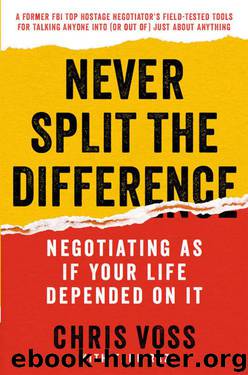0062407805 (N) by Chris Voss

Author:Chris Voss
Language: eng
Format: azw3, epub, mobi
ISBN: 9780062407801
Publisher: HarperBusiness
Published: 2016-05-16T16:00:00+00:00
CHAPTER 7
CREATE THE ILLUSION OF CONTROL
A month after I’d finished working the case of Jeffrey Schilling in May 2001, I got orders from headquarters to head back to Manila. The same bad guys who’d taken Schilling, a brutal group of radical Islamists named the Abu Sayyaf, had raided the Dos Palmas private diving resort and taken twenty hostages, including three Americans: Martin and Gracia Burnham, a missionary couple from Wichita, Kansas; and Guillermo Sobero, a guy who ran a California waterproofing firm.
Dos Palmas was a negotiator’s nightmare from the start. The day after the kidnappings, the recently elected Philippine president, Gloria Macapagal-Arroyo, set up the most confrontational, nonconstructive dynamic possible by publicly declaring “all-out war” on the Abu Sayyaf.
Not exactly empathetic discourse, right?
It got a lot worse.
The Philippine army and marines had a turf war in the midst of the negotiations, pissing off the kidnappers with several botched raids. Because American hostages were involved, the CIA, the FBI, and U.S. military intelligence were all called in and we too squabbled among ourselves. Then the kidnappers raped and killed several hostages, 9/11 happened, and the Abu Sayyaf was linked to Al Qaeda.
By the time the crisis concluded in an orgy of gunshots in June 2002, Dos Palmas had officially become the biggest failure in my professional life. To call it a train wreck would be generous, if you know what I mean.
But failures plant the seeds of future success, and our failure in the Philippines was no exception.
If the Dos Palmas calamity showed me anything, it was that we all were still suffering under the notion that negotiation was a wrestling match where the point is to exhaust your opponent into submission, hope for the best, and never back down.
As my disappointment with Dos Palmas forced me to reckon with our failed techniques, I took a deep look into the newest negotiating theories—some great and some completely harebrained—and I had a chance encounter with a case in Pittsburgh that completely changed how I looked at the interpersonal dynamics of negotiation conversations.
From the ashes of Dos Palmas, then, we learned a lesson that would forever change how the FBI negotiated kidnappings. We learned that negotiation was coaxing, not overcoming; co-opting, not defeating. Most important, we learned that successful negotiation involved getting your counterpart to do the work for you and suggest your solution himself. It involved giving him the illusion of control while you, in fact, were the one defining the conversation.
The tool we developed is something I call the calibrated, or open-ended, question. What it does is remove aggression from conversations by acknowledging the other side openly, without resistance. In doing so, it lets you introduce ideas and requests without sounding pushy. It allows you to nudge.
I’ll explain it in depth later on, but for now let me say that it’s really as simple as removing the hostility from the statement “You can’t leave” and turning it into a question.
“What do you hope to achieve by going?”
DON’T TRY TO NEGOTIATE IN
Download
0062407805 (N) by Chris Voss.epub
0062407805 (N) by Chris Voss.mobi
This site does not store any files on its server. We only index and link to content provided by other sites. Please contact the content providers to delete copyright contents if any and email us, we'll remove relevant links or contents immediately.
Hit Refresh by Satya Nadella(9107)
The Compound Effect by Darren Hardy(8903)
Change Your Questions, Change Your Life by Marilee Adams(7718)
Nudge - Improving Decisions about Health, Wealth, and Happiness by Thaler Sunstein(7678)
The Black Swan by Nassim Nicholas Taleb(7086)
Deep Work by Cal Newport(7040)
Rich Dad Poor Dad by Robert T. Kiyosaki(6576)
Daring Greatly by Brene Brown(6486)
Principles: Life and Work by Ray Dalio(6383)
Playing to Win_ How Strategy Really Works by A.G. Lafley & Roger L. Martin(6182)
Man-made Catastrophes and Risk Information Concealment by Dmitry Chernov & Didier Sornette(5981)
Digital Minimalism by Cal Newport;(5740)
Big Magic: Creative Living Beyond Fear by Elizabeth Gilbert(5726)
The Myth of the Strong Leader by Archie Brown(5482)
The Slight Edge by Jeff Olson(5397)
Discipline Equals Freedom by Jocko Willink(5355)
The Motivation Myth by Jeff Haden(5191)
The Laws of Human Nature by Robert Greene(5136)
Stone's Rules by Roger Stone(5065)
